SSW
020121AfghanistanHow life under Taliban rule in Afghanistan has changed - and how it hasn't
The Washington Post December 30, 2020
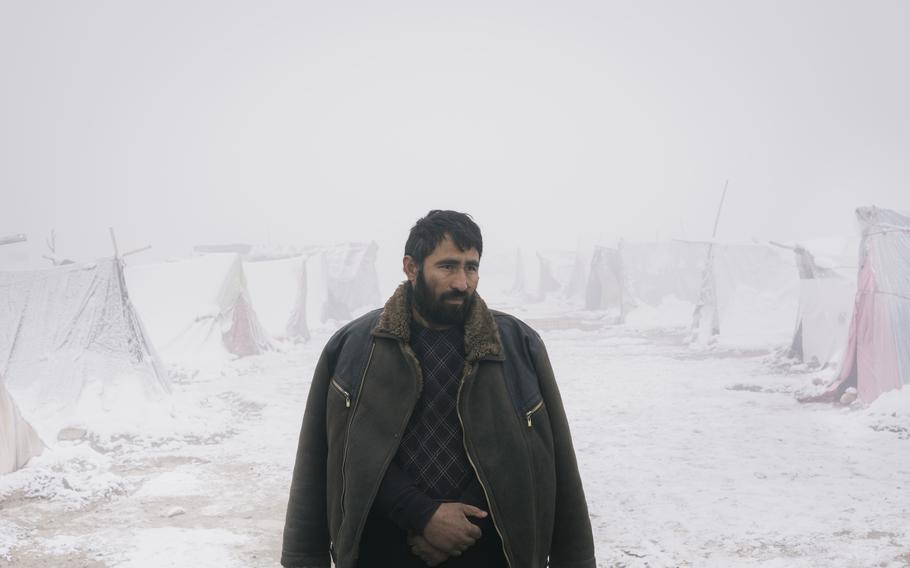
120p na Muhammad, 39, was detained by the Taliban and punished with 109 lashes for his membership in a pro-government militia. MUST CREDIT: Photo by Lorenzo Tugnoli for The Washington Post. (Lorenzo Tugnoli)
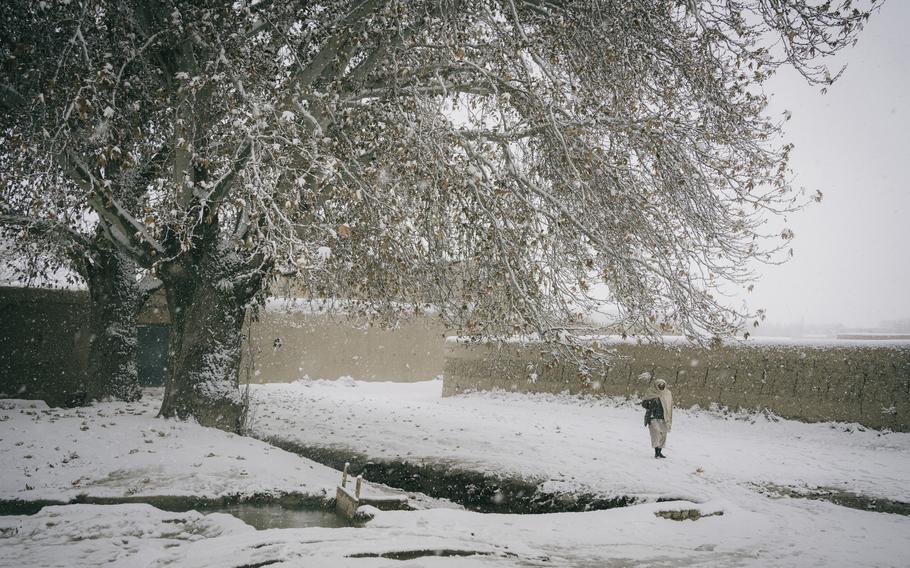
120p na A man walks in the snow in Mazar-e Sharif. MUST CREDIT: Photo by Lorenzo Tugnoli for The Washington Post. (Lorenzo Tugnoli)
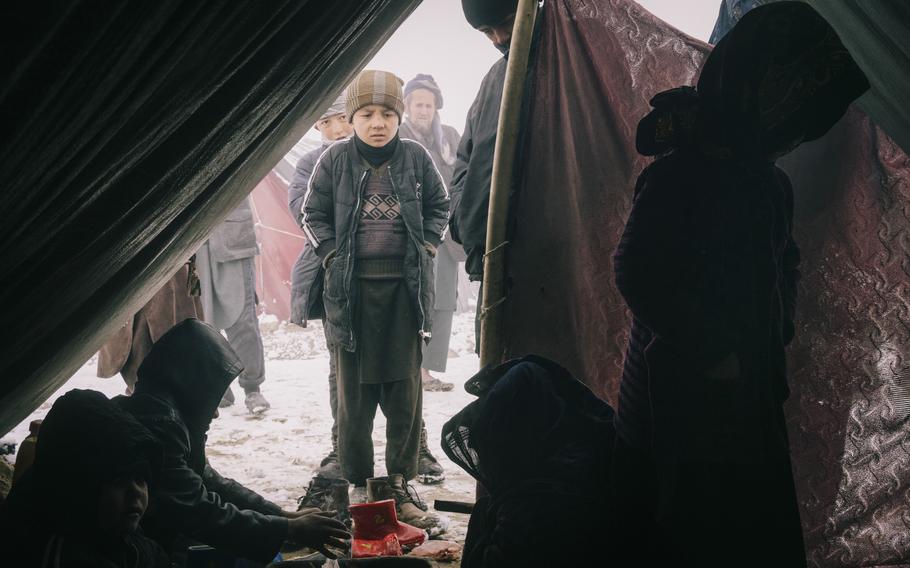
120p na A camp for internally-displaced people near the city of Mazar-e Sharif, Afghanistan. MUST CREDIT: Photo by Lorenzo Tugnoli for The Washington Post. (Lorenzo Tugnoli)
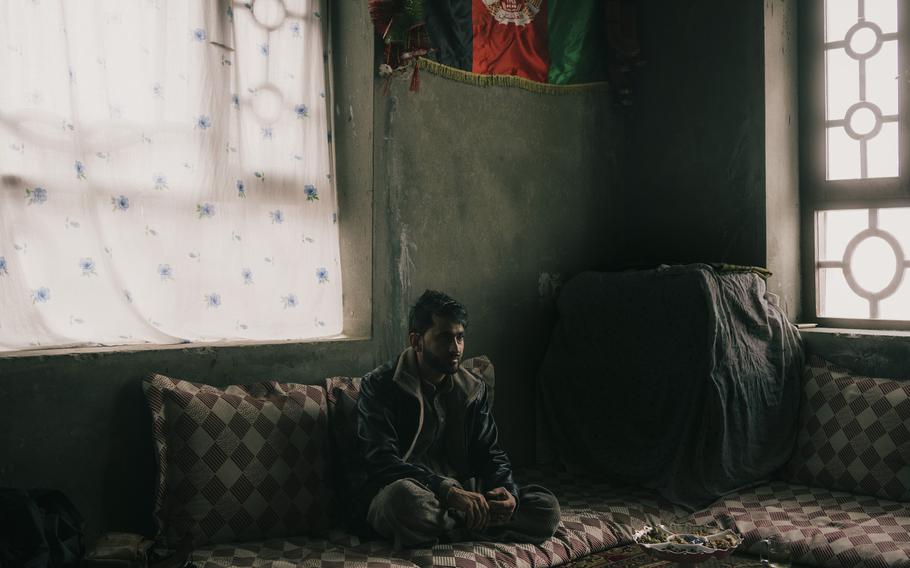
120p na A resident of Mazar-e Sharif, this man commutes to Taliban-controlled territory to work at his father's brick factory. MUST CREDIT: Photo by Lorenzo Tugnoli for The Washington Post. (Lorenzo Tugnoli)
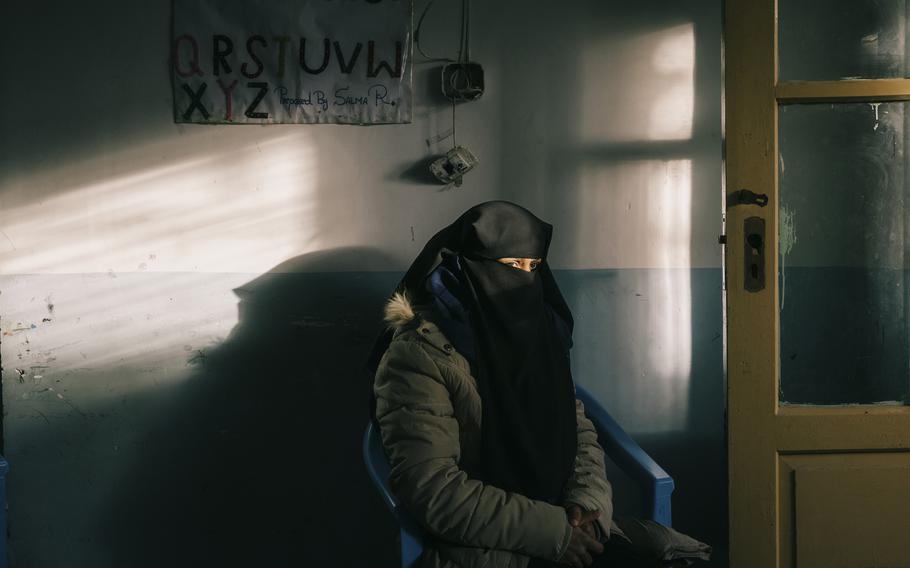
120p na A 33-year-old mother of six in Kandahar. She was recently tormented by young men in her deeply conservative village. MUST CREDIT: Photo by Lorenzo Tugnoli for The Washington Post. (Lorenzo Tugnoli)
KABUL, Afghanistan - Over two decades of conflict and politicking, Taliban control in Afghanistan has become a patchwork of edicts and codes, with some areas seeing modest reform. But overall, fear and intimidation remain at the heart of the militant group's command.
In one district, elders successfully lobbied Taliban fighters to open a high school for girls. In other provinces, clinics funded by international aid groups are now allowed to function. But in those same places, harsh, often public punishments remain common. Torture and imprisonment are widely used for infringements as minor as possessing the wrong SIM card.
The Taliban is stronger now than it has been since it was forced from power in 2001. Over the years, it has captured territory across the country and today exercises control or influence over at least half of Afghanistan. How the Taliban governs - and how its tactics have changed over time - provides a window into how the group might rule if it reaches a political settlement with the Afghan government.
Interviews with 19 civilians living or working in Taliban territory reveal a governing force capable of making slight changes - such as rules on beard length - to appease local communities. But the group remains rooted in an extreme interpretation of Islamic law that appears to leave no room for compromise with the more liberal laws in government-held parts of Afghanistan.
Public beatings and executions are routine inside the Taliban's Afghanistan. And women are almost entirely absent from public life, largely denied equal access to education and employment. Access to health care and some education has expanded under the Taliban, but that is largely a result of work by select international aid groups the militants have allowed to operate.
"All their changes are only for their own benefit," said a 22-year-old university student from Helmand province who has lived in Taliban-controlled territory on and off his entire life. Like others in this article, he spoke on the condition of anonymity out of fear of retribution by the Taliban.
"If you start criticizing the Taliban, you are their enemy," he said. "Nothing has ever changed with that."
In a statement, the Taliban did not deny using beatings as punishment or imprisoning civilians for minor offenses, such as using a SIM card issued by a government-owned company. Zabiullah Mujahid, a spokesman for the group, defended the punishments as necessary to prevent infractions and keep civilians under Taliban control safe.
The Taliban formed in 1994 in Afghanistan's southern Kandahar province, imposing a hard-line interpretation of Islamic law to quell the chaos of the country's civil war. In 1996, the group took control of Kabul.
Afghanistan under Taliban control became an international pariah. The regime, largely cut off from the outside world because of its horrific human rights record, produced millions of refugees, plunged an already impoverished country deeper into distress and forced more than 7 million Afghans to the brink of starvation.
If the Taliban assumes a share of formal power in Afghanistan - the ultimate goal of peace talks between the militants and the government - many fear the group will bring its draconian approach to Islamic law and use of intimidation with it.
- - -
Balkh, northern Afghanistan
The 27-year-old teacher's story of torture began with a short phone call.
The voice was a woman he knew. They had been neighbors and childhood friends. But the call instantly terrified him, he recalled seven months later. The woman was married, and communicating with him, a nonrelative male, was strictly forbidden in his Taliban-controlled district in Balkh province. He ended the conversation as quickly as possible.
The next day, he was summoned to a Taliban base, where he was handcuffed and led to a cell. At the base, he said, he saw members of a family feuding with his relatives and realized he had been set up.
"I'm an educated man. In our society, I was somebody," he said.
Hours or a day passed in complete darkness, then the district governor of the Taliban's shadow government appeared and demanded a confession, accusing the teacher of committing adultery with the woman who had called him. When the teacher pleaded his innocence, the district governor beat him with a tree branch and threatened to lynch him by dragging his body from a motorbike around the village.
He was released two days later, after a group of tribal elders vouched for his innocence. For weeks, he refused to leave his home, then he fled his district completely. Only months later did he return home.
"It destroyed my dignity," he said. "I totally lost myself."
Mujahid, the Taliban spokesman, said the teacher was found having "illicit relations with a woman, which is a punishable crime under sharia."
"Taliban didn't beat him on their own, but it was a verdict of the court," he said. "Though it wasn't proved that he committed adultery, he was punished to warn him from indulging any such activities in the future."
Several of the people interviewed by The Washington Post said they or someone close to them had suffered torture at the hands of the Taliban. A Human Rights Watch report published this year described the Taliban justice system as one that is "focused on punishment and largely relies on confessions, often obtained by beatings and other forms of torture."
Abuse and imprisonment are used in response to all kinds of infractions, large and small. Sali Khan Momand, a 28-year-old tailor who also lives in Taliban-controlled territory in Balkh province, said Taliban fighters beat his uncle with their rifle butts on the side of the road when they found he was carrying a SIM card banned by the militants. He was held in prison for four days.
Mujahid confirmed that a SIM card was confiscated but did not comment on the allegation of violence.
Muhammad, 39, an ethnic Uzbek from the Taliban-held district of Zari in Balkh, was detained by the Taliban and punished with 109 lashes for his membership in a pro-government militia. Like many Afghans, he goes by a single name.
The Taliban held him for months before he was released in a prisoner swap. Once free, he fled his home with his family and went to a desolate camp for the displaced on the edge of Mazar-e Sharif, where nearly a year later his back still bears the scars of the torture.
The Taliban confirmed that he was arrested and punished.
"This is our right to punish such people who are fighting against us and want to kill us," Mujahid said.
Other civilians said they prefer the Taliban's justice system to that of the government. A taxi driver who lives in Mazar-e Sharif said he repeatedly traveled into Taliban territory to obtain a ruling on a family property dispute after government courts proved ineffective.
"The Taliban's process is faster than the government," said the driver, Mubaraksha Zafar, 38, "and there is no corruption."
- - -
Logar, central Afghanistan
When the Taliban swept into Mohammed Ibrahim's district in southern Logar province nearly 15 years ago, families locked themselves inside their homes, terrified of the unfamiliar fighters roaming their streets. But as security steadily improved, residents grew accustomed to the militants' rules, and the Taliban began recruiting locally, a move that built trust within the community, Ibrahim said.
"I remember those days," said Ibrahim, 34. The Taliban was "not organized then and all the fighters were so young."
Over the years, as the group consolidated its hold on the district and surrounding areas, it developed a system for lodging complaints. One of the most significant changes came when a group of tribal elders successfully lobbied the militants to open a girls' high school and allow young men and women from the district to travel to government-held territory to attend university.
"The Taliban realized it was in their own interest," after considerable community pressure, Ibrahim said. "The elders told them, if our children study agriculture, they can return to the village and help recognize the diseases affecting our crops."
But the developments in Ibrahim's village are not mirrored elsewhere, even in bordering provinces.
"The Taliban are not just a bunch of thugs that don't understand the local dynamics," said an Afghan researcher who studies the group and works in Taliban territory on a regular basis.
In areas where local community ties are strong enough to stand up to the Taliban, the researcher said, the militants adopt a more conciliatory approach. But in territory that lacks those ties, there is no incentive for the Taliban to move away from strict rules and harsh punishments.
The Taliban uses "intimidation as much as they can," he said, "but they also know the limitation of intimidation."
- - -
Helmand and Kandahar, southern Afghanistan
Until just a few months ago, Kandahar was an island of government-held territory in Afghanistan's south, the Taliban's traditional heartland.
That began to change this year when the militants, emboldened by their deal with the United States, launched offensives to expand their control in Kandahar and neighboring Helmand.
As fighters inched closer to Kandahar city, the provincial capital, women at a community center in the city began reporting harassment as they traveled to and from classes, said Maryam Durani, a women's rights activist. She established the center to help women from both Taliban and government-controlled territory, and it operated for years without serious harassment, she said.
In one recent incident, a 33-year-old mother of six taking lessons in handicrafts at the center was tormented by young men on a motorbike.
"Why are you leaving your home? Why are you even going to school?" they shouted. As they whizzed past, they partially pulled off her headscarf, exposing her hair, a deeply shameful act in the conservative village where the woman lives.
Objection to girls' education was a hallmark of the pre-2001 Taliban, and it appears to be a characteristic that persists in the militants' strongholds, despite pressure elsewhere for change.
While local Taliban leadership in Afghanistan's northern and central regions have allowed girls' schools to operate for years, much of the country's south had none. To this day, not a single school for girls exists in either Helmand or Uruzgan, both deeply conservative and rural provinces.
"The only change in their rule is that there is more cruelty," said a farmer from Helmand. The 34-year-old man is from Nadali, a district controlled by the Taliban from 2008 to 2011. Last year, it was one of the areas the militants brought back under their command.
During the earlier period of Taliban rule, he said, the militants were disorganized and largely preoccupied by fighting, and rarely enforced dress codes. But after the Taliban solidified its control of the area in recent months, its leniency evaporated.
Fighters now forcefully collect taxes, demand food and shelter from local families, and issue pronouncements based on strict Islamic law over a local radio station.
"The free will was stolen from our lives," the farmer said. After his neighbors were brutally beaten for denying Taliban fighters housing, he fled to the government-held provincial capital earlier this month.
The Taliban denied forcibly collecting taxes.
"Our leadership has a clear-cut policy that no one should be forced to pay taxes, but let the people do so of their free will," Mujahid said. "The people do support us for the last 20 years. They provide food, shelter and pay donations."
The Taliban's recent battlefield advances and consolidation of control in southern Afghanistan are what motivated the mother of six from Kandahar to begin taking classes at the women's center.
"The reason I'm going to school is because we fear the Taliban are returning, and I want to learn a skill I can practice when I'm not allowed to leave my home," she said. "Dark days are coming again."
- - -
The Washington Post's Haq Nawaz Khan in Peshawar, Pakistan, contributed to this report.